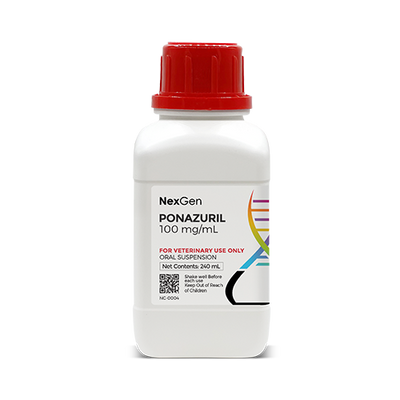
Ponazuril 150 mg/mL, Oral Suspension, (240mL)
Login for pricing
- Brand
- Mixlab
- SKU:
- NC-0142
- Product Type:
- Suspension
- Size:
- 240ml
- Administration:
- Oral
- Therapeutic Class:
- Antiprotozoal
Ponazuril is an anticoccidial (antiprotozoal) compound with activity against several genera of the phylum Apicomplexa. Ponazuril (also known as toltrazuril sulfone) is a metabolite of the poultry antiprotozoal drug toltrazuril. Ponazuril is a triazine-based drug that acts to inhibit enzyme systems in protozoa and/or decreasing pyrimidine synthesis.
‚ÄãPonazuril is indicated for the treatment of equine protozoal myeloencephalitis (EPM), which can be caused by either of two related protozoan parasites, Sarcocystis neurona and Neospora hughesi, although S. neurona is the most frequent etiologic pathogen.
EPM is a progressive, degenerative neurological disease of the central nervous system that has been described in horses for decades. The disease is one of the most commonly diagnosed neurological disorders of horses in the Americas. While great strides have been made throughout the last decade in an effort to understand EPM, many questions remain unanswered concerning its etiology, pathogenesis, occurrence, treatment, and diagnosis. Clinical improvement is noted in 60% to 75% of horses treated with ponazuril, however.1
Where to buy Ponazuril
Ponazuril is available in the U.S. through several pharmaceutical manufacturers and through veterinary custom compounding companies.
Please consult your veterinarian prior to beginning any treatment regimen.
FOR RX ONLY: A valid prescription from a licensed veterinarian is required for dispensing this medication.
1Howe DK, MacKay RJ, Reed SM. Equine protozoal myeloencephalitis. Vet Clin North Am Equine Pract. 2014 Dec;30(3):659-75. doi: 10.1016/j.cveq.2014.08.012. Epub 2014 Nov 6. PMID: 25441115.
3Litster, Annette & Nichols, J. & Hall, K. & Camp, Joe & Mohamed, Ahmed. (2014). Use of ponazuril paste to treat coccidiosis in shelter-housed cats and dogs. Veterinary Parasitology. 202. 10.1016/j.vetpar.2014.03.003.











